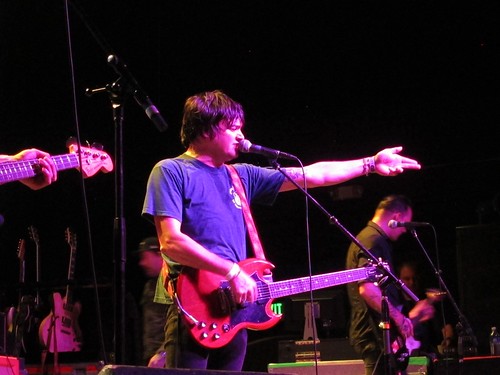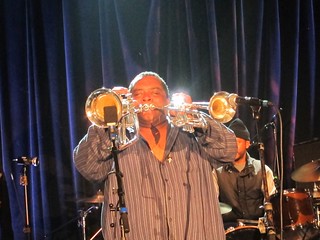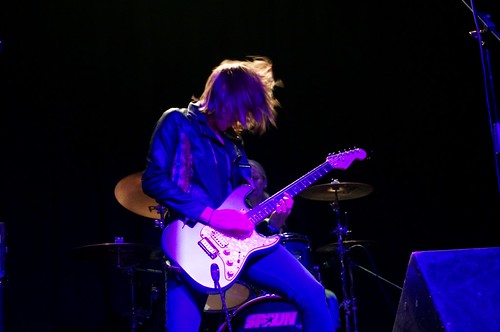Albums are great, but the electric zing of a live show is unbeatable. There were a number of great choices -- sharing Kiss and Def Leppard with my son, a wild night with the always dependable Reel Big Fish -- but these were my top five for the year.
#5 - ...And You Will Know Us by the Trail of Dead, with La Femme and others

La Femme's theatrical surf-wave opening was a nice appetizer, but the main course was Trail of Dead performing their classic Source Tags & Codes album in its entirety. Touring on a classic early album is usually, at best, a kind of parlor trick, where the band goes through the motions and trades on the audience's connection with a band and album locked deep in the past. Fortunately, Trail of Dead brought an immediacy to the material; even stripped of the studio production work, these songs were powerful and the band attacked them with enthusiasm, tapping into their own connections to the tunes and their younger selves. This was also my first show seeing the band in their more recent stripped down line-up, and I was impressed with the punch and their energy. Now, I'm just waiting for them to tour on their latest, IX.
(full review)
#4 - Dirty Dozen Brass Band / Pimps of Joytime

The old guard and young turks took turns leading off the shows on this tour, and Denver saw the Pimps of Joytime opening for the Dirty Dozen Brass Band. PoJT always summon a frantic stage presence rooted in the funk, but this concert also featured some more dance oriented grooves to expand their range. Brian J's guitar work was tightly honed as per usual, but John Staten (drums) and David Bailis (bass/keys) carried the set.
The members of the Dirty Dozen Brass Band may well be quite a bit older, but they had no problem following up on the PoJT's pace and doubling down. From nomadic free jazz noodling to wicked tight funk, the band delivered their songs with polished panache and fiery chops. They were completely true to their New Orleans roots, but they whipped out plenty of fun twists, from Kirk Joseph's mutated sousaphone effects to Roger Lewis' raunchy soul revue on "Dirty Old Man".
(full review)
#3 - Zoë Keating

Zoë Keating's looped and layered cello work is stunning on her recordings, where she coaxes a host of surprising sounds from her instrument and effects and her musical vision is fully realized, but her live performance was amazing. All great musicians find a balance between phenomenal technique and the emotional depth, and Keating was especially impressive as she ranged from delicate motifs to stormy passion in her music, but still made it look natural, if not completely effortless. The crowd maintained a respectful formality, but Keating's humble stage presence bridged that gap and connected her to the audience. As an artist, she communicated her obsessive focus and revealed a little bit of the juggling she manages as she builds her loops, but her likable personality tied her to her fans.
(full review)

Mediocre openers can ruin an otherwise great show and a strong headliner can sabotage the earlier acts on the bill. This show dodged both those bullets, perhaps because the local bands didn't overlap that much with Megafauna's powerful sound, but still featured strong lead personalities. Hillary Hand was the shyest of the lot, with a band that filled out her well-written singer-songwriter sound. Bear.'s Will Livingston played offered plenty of unpredictability, and the theatrical Scotty Saunders turned Instant Empire's ragtag outfit into a solid punk/new wave crew.
None of this prepared us for Dani Neff and Megafauna. They casually took the stage and proceeded to shock and awe the crowd with some of the most primal guitar rock I've heard in the last several years. They drew on classic rock, metal, and post-rock, but created an amalgam all their own. Neff's muscular guitar work was the centerpiece, but it was complemented by Zack Humphrey's tight drumming and rhythmic shifts along with Bryan Wright's riff-driven bass work. The songs varied across hybrid genres, making the set consistently novel. This show was even more impressive because all the bands were playing for a relatively empty house, but still giving it everything that the music deserved.
(full review)
#1 - Beats Antique with Blockhead and Itchy-O Marching Band
 Beats Antique regularly celebrates form and substance, with both in spades. Choreographer Zoe Jakes has always elevated their performances to Events rather than mere concerts, but their richly evocative world-tronica sound is equally important in creating the ritualistic rave mood. This show was tied to their recent album, A Thousand Faces, but the band's vision surpassed anything they had ever done before. After they finished the album, they took to Kickstarter and raised money to create this show, and every penny went towards making a spectacle worthy of a pop mega-star performing a Vegas show set-piece. Innumerable costume changes, state of the art lighting and video projection, and Jakes' mesmerizing choreography all came together to prove that nothing exceeds like excess.
Beats Antique regularly celebrates form and substance, with both in spades. Choreographer Zoe Jakes has always elevated their performances to Events rather than mere concerts, but their richly evocative world-tronica sound is equally important in creating the ritualistic rave mood. This show was tied to their recent album, A Thousand Faces, but the band's vision surpassed anything they had ever done before. After they finished the album, they took to Kickstarter and raised money to create this show, and every penny went towards making a spectacle worthy of a pop mega-star performing a Vegas show set-piece. Innumerable costume changes, state of the art lighting and video projection, and Jakes' mesmerizing choreography all came together to prove that nothing exceeds like excess.
Before the show started, the stage set was cluttered with boxy white blocks that would serve as screens for the elaborate video projection. Honestly, I wasn't sure what to expect, but this proved to be incredibly versatile. Each song had its setting and the collection of screens surrounded the band and dancers, immersing them into the scene. Even more importantly, the music held its own against the technology and enticed the audience into movement with hypnotic beats, visceral bass throb, and exotic melodies.
(full review)
#5 - ...And You Will Know Us by the Trail of Dead, with La Femme and others
3 April 2014 (Summit Music Hall, Denver CO)

La Femme's theatrical surf-wave opening was a nice appetizer, but the main course was Trail of Dead performing their classic Source Tags & Codes album in its entirety. Touring on a classic early album is usually, at best, a kind of parlor trick, where the band goes through the motions and trades on the audience's connection with a band and album locked deep in the past. Fortunately, Trail of Dead brought an immediacy to the material; even stripped of the studio production work, these songs were powerful and the band attacked them with enthusiasm, tapping into their own connections to the tunes and their younger selves. This was also my first show seeing the band in their more recent stripped down line-up, and I was impressed with the punch and their energy. Now, I'm just waiting for them to tour on their latest, IX.
(full review)
#4 - Dirty Dozen Brass Band / Pimps of Joytime
27 February 2014 (Bluebird Theater, Denver CO)

The old guard and young turks took turns leading off the shows on this tour, and Denver saw the Pimps of Joytime opening for the Dirty Dozen Brass Band. PoJT always summon a frantic stage presence rooted in the funk, but this concert also featured some more dance oriented grooves to expand their range. Brian J's guitar work was tightly honed as per usual, but John Staten (drums) and David Bailis (bass/keys) carried the set.
The members of the Dirty Dozen Brass Band may well be quite a bit older, but they had no problem following up on the PoJT's pace and doubling down. From nomadic free jazz noodling to wicked tight funk, the band delivered their songs with polished panache and fiery chops. They were completely true to their New Orleans roots, but they whipped out plenty of fun twists, from Kirk Joseph's mutated sousaphone effects to Roger Lewis' raunchy soul revue on "Dirty Old Man".
(full review)
#3 - Zoë Keating
3 May 2014 (Boulder Theater, Boulder CO)

Zoë Keating's looped and layered cello work is stunning on her recordings, where she coaxes a host of surprising sounds from her instrument and effects and her musical vision is fully realized, but her live performance was amazing. All great musicians find a balance between phenomenal technique and the emotional depth, and Keating was especially impressive as she ranged from delicate motifs to stormy passion in her music, but still made it look natural, if not completely effortless. The crowd maintained a respectful formality, but Keating's humble stage presence bridged that gap and connected her to the audience. As an artist, she communicated her obsessive focus and revealed a little bit of the juggling she manages as she builds her loops, but her likable personality tied her to her fans.
(full review)
19 June 2014 (Moon Room at Summit Music Hall, Denver CO)

Mediocre openers can ruin an otherwise great show and a strong headliner can sabotage the earlier acts on the bill. This show dodged both those bullets, perhaps because the local bands didn't overlap that much with Megafauna's powerful sound, but still featured strong lead personalities. Hillary Hand was the shyest of the lot, with a band that filled out her well-written singer-songwriter sound. Bear.'s Will Livingston played offered plenty of unpredictability, and the theatrical Scotty Saunders turned Instant Empire's ragtag outfit into a solid punk/new wave crew.
None of this prepared us for Dani Neff and Megafauna. They casually took the stage and proceeded to shock and awe the crowd with some of the most primal guitar rock I've heard in the last several years. They drew on classic rock, metal, and post-rock, but created an amalgam all their own. Neff's muscular guitar work was the centerpiece, but it was complemented by Zack Humphrey's tight drumming and rhythmic shifts along with Bryan Wright's riff-driven bass work. The songs varied across hybrid genres, making the set consistently novel. This show was even more impressive because all the bands were playing for a relatively empty house, but still giving it everything that the music deserved.
(full review)
#1 - Beats Antique with Blockhead and Itchy-O Marching Band
11 April 2014 (Fillmore Auditorium, Denver CO)
 Beats Antique regularly celebrates form and substance, with both in spades. Choreographer Zoe Jakes has always elevated their performances to Events rather than mere concerts, but their richly evocative world-tronica sound is equally important in creating the ritualistic rave mood. This show was tied to their recent album, A Thousand Faces, but the band's vision surpassed anything they had ever done before. After they finished the album, they took to Kickstarter and raised money to create this show, and every penny went towards making a spectacle worthy of a pop mega-star performing a Vegas show set-piece. Innumerable costume changes, state of the art lighting and video projection, and Jakes' mesmerizing choreography all came together to prove that nothing exceeds like excess.
Beats Antique regularly celebrates form and substance, with both in spades. Choreographer Zoe Jakes has always elevated their performances to Events rather than mere concerts, but their richly evocative world-tronica sound is equally important in creating the ritualistic rave mood. This show was tied to their recent album, A Thousand Faces, but the band's vision surpassed anything they had ever done before. After they finished the album, they took to Kickstarter and raised money to create this show, and every penny went towards making a spectacle worthy of a pop mega-star performing a Vegas show set-piece. Innumerable costume changes, state of the art lighting and video projection, and Jakes' mesmerizing choreography all came together to prove that nothing exceeds like excess.Before the show started, the stage set was cluttered with boxy white blocks that would serve as screens for the elaborate video projection. Honestly, I wasn't sure what to expect, but this proved to be incredibly versatile. Each song had its setting and the collection of screens surrounded the band and dancers, immersing them into the scene. Even more importantly, the music held its own against the technology and enticed the audience into movement with hypnotic beats, visceral bass throb, and exotic melodies.
(full review)

 Japanese punk legends Shonen Knife have been making drop-dead simple garage punk music for more than 30 years. Inspired by American bands like the Ramones but committed to their uniquely Japanese kawaii personas, they've create a solidly original sound. Their latest, Overdrive, finds them still kicking ass, belying the cute smiles or childlike lyrics. Some of the songs, like "Black Crow" or "Robots From Hell", delve into darker moods and leaven this strong, head-banging album, but all the songs are strong.
Japanese punk legends Shonen Knife have been making drop-dead simple garage punk music for more than 30 years. Inspired by American bands like the Ramones but committed to their uniquely Japanese kawaii personas, they've create a solidly original sound. Their latest, Overdrive, finds them still kicking ass, belying the cute smiles or childlike lyrics. Some of the songs, like "Black Crow" or "Robots From Hell", delve into darker moods and leaven this strong, head-banging album, but all the songs are strong. Tori Amos may have gotten her start with pop music when she was kicked out of the Peabody Conservatory of Music, but she's buried that demon over the last couple of years with orchestrally oriented releases like Night of the Hunter (2011) and Gold Dust (2012). Unrepentant Geraldines sees her swinging back into pop, without losing any of the edge she's honed over the years. Amos hasn't gotten any younger and that's all to the good, especially on standout track, "16 Shades of Blue", which addresses ageism in the music industry even as it reflects a very modern production aesthetic.
Tori Amos may have gotten her start with pop music when she was kicked out of the Peabody Conservatory of Music, but she's buried that demon over the last couple of years with orchestrally oriented releases like Night of the Hunter (2011) and Gold Dust (2012). Unrepentant Geraldines sees her swinging back into pop, without losing any of the edge she's honed over the years. Amos hasn't gotten any younger and that's all to the good, especially on standout track, "16 Shades of Blue", which addresses ageism in the music industry even as it reflects a very modern production aesthetic. Plenty of bands have played the blues revival card and, even if it's not as popular as it once was, Lonesome Shack isn't making a radical artistic choice to draw on the rootsy power of the blues on the aptly named More Primitive. But more than just steeping themselves in the tradition, they seem to have an instinctive feel for organic rhythms that could care less about metronomes and restless vamps that never let the listener drift into ambivalence. Their raw palette is colored with visceral dabs of nervous tension, moody reveries, defiant snarls, and introspective memory.
Plenty of bands have played the blues revival card and, even if it's not as popular as it once was, Lonesome Shack isn't making a radical artistic choice to draw on the rootsy power of the blues on the aptly named More Primitive. But more than just steeping themselves in the tradition, they seem to have an instinctive feel for organic rhythms that could care less about metronomes and restless vamps that never let the listener drift into ambivalence. Their raw palette is colored with visceral dabs of nervous tension, moody reveries, defiant snarls, and introspective memory. Tragedy often acts as inspiration and LOSE is driven by Joe D'Agostino's grief at his friend's death. Rather than turning the album into a direct elegy, Cymbals Eat Guitars extends that idea into the larger theme of childhood's end. Losing friends and recognizing self-destructive behavior are just a couple of things we have to face as we grow up. Despite the emo potential, LOSE is neither self-pitying or self-indulgent. The band deals with all of the emotion in their inimitable fashion: cathartic waves of guitar crash, songs evolve into surprising directions, and dreamy, distracted interludes break up the heaviness.
Tragedy often acts as inspiration and LOSE is driven by Joe D'Agostino's grief at his friend's death. Rather than turning the album into a direct elegy, Cymbals Eat Guitars extends that idea into the larger theme of childhood's end. Losing friends and recognizing self-destructive behavior are just a couple of things we have to face as we grow up. Despite the emo potential, LOSE is neither self-pitying or self-indulgent. The band deals with all of the emotion in their inimitable fashion: cathartic waves of guitar crash, songs evolve into surprising directions, and dreamy, distracted interludes break up the heaviness. Bike for Three pairs rapper Buck 65 with electronic producer Greetings From Tuskan (Joëlle Lê), but what makes the duo so strong is how they deconstruct the basic relationship between rapper and producer. Normal hip hop collaborations place the backing music and beats in a supporting role, to set the mood without overshadowing the emcee's personality. Bike for Three drops back to the definition of the word "collaboration". Lê and Buck 65 work together on these pieces to blur the lines: these tracks are electronic grooves with backing lyrical flow every bit as much as they're wicked raps with exotic vocals and textures.
Bike for Three pairs rapper Buck 65 with electronic producer Greetings From Tuskan (Joëlle Lê), but what makes the duo so strong is how they deconstruct the basic relationship between rapper and producer. Normal hip hop collaborations place the backing music and beats in a supporting role, to set the mood without overshadowing the emcee's personality. Bike for Three drops back to the definition of the word "collaboration". Lê and Buck 65 work together on these pieces to blur the lines: these tracks are electronic grooves with backing lyrical flow every bit as much as they're wicked raps with exotic vocals and textures. Four years ago, Wax Fang created their stoner mind-trip, "The Astronaut: Part 1", a beautiful blend of Pink Floydian mutation crossed with neo-psychedelic exploration. This release uses that epic track as a jumping off point. While "Part 1" is long enough to count as its own concept album, they've built on the idea and taken the story off into some interesting directions, with darkness and doubt and a transcendent finish. The larger pieces are framed by shorter contrasting bits. Revisiting old ideas is a risky step, but Wax Fang takes on their earlier work and creates a richer, more nuanced project.
Four years ago, Wax Fang created their stoner mind-trip, "The Astronaut: Part 1", a beautiful blend of Pink Floydian mutation crossed with neo-psychedelic exploration. This release uses that epic track as a jumping off point. While "Part 1" is long enough to count as its own concept album, they've built on the idea and taken the story off into some interesting directions, with darkness and doubt and a transcendent finish. The larger pieces are framed by shorter contrasting bits. Revisiting old ideas is a risky step, but Wax Fang takes on their earlier work and creates a richer, more nuanced project. Megafauna takes the epigram, "Too much is never enough" to heart and delivers a visceral, hard-hitting mix of post-rock complexity, retro metallic darkness, and theatrical posturing. Bandleader Dani Neff anchors the songs not with her sweet vocal versatility—which can range from odd and vulnerable to ragged and stern—but through her monster guitar chops. She builds heavy riffs like the masters of classic rock, and effortlessly transitions into shred mode to push the songs over the top. All of that is impressive, but she and Megafauna make this list because they also know how to use dynamics and subtlety to make their punches hit that much harder.
Megafauna takes the epigram, "Too much is never enough" to heart and delivers a visceral, hard-hitting mix of post-rock complexity, retro metallic darkness, and theatrical posturing. Bandleader Dani Neff anchors the songs not with her sweet vocal versatility—which can range from odd and vulnerable to ragged and stern—but through her monster guitar chops. She builds heavy riffs like the masters of classic rock, and effortlessly transitions into shred mode to push the songs over the top. All of that is impressive, but she and Megafauna make this list because they also know how to use dynamics and subtlety to make their punches hit that much harder. In contrast to Megafauna's Maximalist, Mazes asserts that less is more by making the most of the fairly simple production and getting the complexity from the wide ranging musical directions they take Wooden Aquarium. Fun house reflections of widely disparate bands like Pavement, Supertramp, and Guided By Voices populate the album, but Mazes asserts their own optimistic jangle that persists through everything from disorienting trippiness to driving Krautrock. The overarching sound is pop psychedelic goodness, but with a new wave twist.
In contrast to Megafauna's Maximalist, Mazes asserts that less is more by making the most of the fairly simple production and getting the complexity from the wide ranging musical directions they take Wooden Aquarium. Fun house reflections of widely disparate bands like Pavement, Supertramp, and Guided By Voices populate the album, but Mazes asserts their own optimistic jangle that persists through everything from disorienting trippiness to driving Krautrock. The overarching sound is pop psychedelic goodness, but with a new wave twist. Lest year, Team Spirit self-titled EP debut made my list because of their perfect balance of thrashing pop punk excitement and tight twin-guitar riffing. It's been a long wait to get a full length release from the band and having seen them live several times in the interval, I honestly wasn't sure they could deliver both the wild excitement of their shows and a polished set of songs to compare with that first sample. I shouldn't have worried about it. Killing Time delivers the perfect mix of party time rock, entertaining humor, and punk swagger. More importantly, Team Spirit shows that they can play the fuck out their songs in the studio just as well as they do in concert.
Lest year, Team Spirit self-titled EP debut made my list because of their perfect balance of thrashing pop punk excitement and tight twin-guitar riffing. It's been a long wait to get a full length release from the band and having seen them live several times in the interval, I honestly wasn't sure they could deliver both the wild excitement of their shows and a polished set of songs to compare with that first sample. I shouldn't have worried about it. Killing Time delivers the perfect mix of party time rock, entertaining humor, and punk swagger. More importantly, Team Spirit shows that they can play the fuck out their songs in the studio just as well as they do in concert. Ever since Rachel Fannan left Sleepy Sun in 2010, they've been leaping out into the great, noisy unknown of neo-psychedelia. While that reinvention may have been forced upon them, they've risen to the challenge and become a stronger band for it. Their last album, Spine Hits, demonstrated that they've become adept at harnessing the cathartic press of swirling feedback and thick brambles of guitar, but Maui Tears finds them showing off their dynamic chops as well. For all the noisy distortion and sonic saturation, they can still create nuanced moments, making the songs ripe for interpretation.
Ever since Rachel Fannan left Sleepy Sun in 2010, they've been leaping out into the great, noisy unknown of neo-psychedelia. While that reinvention may have been forced upon them, they've risen to the challenge and become a stronger band for it. Their last album, Spine Hits, demonstrated that they've become adept at harnessing the cathartic press of swirling feedback and thick brambles of guitar, but Maui Tears finds them showing off their dynamic chops as well. For all the noisy distortion and sonic saturation, they can still create nuanced moments, making the songs ripe for interpretation. Insistent and obsessive,
Insistent and obsessive,  It’s taken six years but
It’s taken six years but 